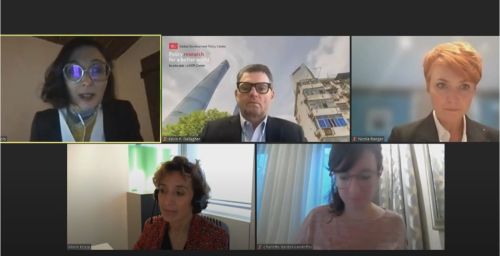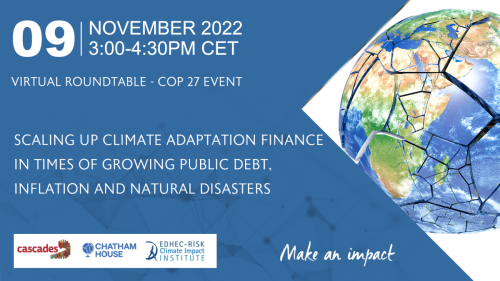
A great success for the COP27 side event: Scaling up climate adaptation finance in times of growing public debt, inflation and natural disasters
Written on 06 Dec 2022.

A great success for the online event organised during the Finance Day at COP 27, by EDHEC-Risk Institute and Chatham House, with over 500 people registered to learn from top experts on climate physical risk adaptation strategies.
The recent IPCC 6th Assessment Report presented evidence of growing economic and financial impacts of climate change. Adapting to climate physical risks requires timely and massive investments and yet adaptation finance is still lagging behind in both high-income countries, in emerging markets and developing economies.
The growth of public debts in response to the pandemic and rising inflation from the energy prices opened concerns about debt sustainability and sovereign spending capacity for adaptation. The International Monetary Fund’s annual meeting, and the G7 meeting highlighted the need to address debt sustainability while making public spending work for the climate. Nevertheless, a strategic framework for adaptation finance is still missing, and so are tailored adaptation finance instruments.

Adaptation finance is still lagging despite increasing climate risks and impacts. Co-organized by Professor Irene Monasterolo from EDHEC-Risk Climate and Chatham House, the COP27 side-event "Scaling up climate adaptation finance in times of growing public debt, inflation and natural disasters" aimed at discussing the following issues:
- What are the challenges for scaling up private and public investments in adaptation (models, policies, instruments)?
- Under which conditions new financial instruments such as sovereign impact bonds could deliver on adaptation?
- How are main financial institutions such as the IMF and World Bank assessing climate risks for sovereigns and responding to them? Are they deploying the right approaches and tools?
- To what extent are private investors considering climate physical risks and adaptation in their portfolios and risk management?
Speakers:
- Marie Briere, Head of Investor Intelligence and Academic Partnerships, Amundi Institute
- Kevin P. Gallagher, Director, Boston University Global Development Policy Center
- Nicola Ranger, Head of Sustainable Finance Research for Development, Smith School of Enterprise and the Environment, University of Oxford
- Charlotte Gardes-Landolfini, Climate Change and Financial Stability Expert, IMF
- Chair: Irene Monasterolo, Head of Research Programme, EDHEC-Risk Climate Impact Institute, Professor of Climate Finance, EDHEC Business School
To watch the replay of the virtual rountable, follow this link or see the video below:
Some key points raised by Professor Monasterolo, moderator of the rountable:
There is a great financing gap when it comes to both mitigation and adaptation to climate change and that related financing gap is even greater for adaptation purposes. It's critical that the international community meets or even exceed the goal of providing $100 billion in climate finance to developing economies each year and to make sure that the sizable amount of the climate finance actually goes to adaptation.
We need better data and models and metrics to allow investors to price or to have investors pricing such risk, in particular physical risk.
We could not expect finance to mobilize if there is no clear policy signal so no clear pathway of industrial policy for greening and for investing in adaptation. But we know also from recent research about the double materiality of climate risks and the papers on climate sentiments, that if investors trust policy, trust an orderly transition, they can massively anticipate them. They could massively foster the low carbon transition and the carbonization and thus leading to lower cost of adjustment and lower challenges for carbon stranded assets.
Partners: CASCADES funded by the European Union's Horizon 2020 research and innovation programme under grant agreement No. 821010, WU Wien, Waddesdon Club, Chatham House.
Learn more about the recent research by Professor Monasterolo:
Managing the financial risks of climate change and pandemics: What we know (and don’t know), published in On Earth.
Asset-Level Climate Physical Risk Assessment and Cascading Financial Losses, available at SSRN.
The double materiality of climate physical and transition risks in the euro area, published with the European Central Bank
Accounting for finance is key for climate mitigation pathways, published in Science.
Compounding COVID-19 and climate risks: The interplay of banks’ lending and government’s policy in the shock recovery, published in the Journal of Banking & Finance
Assessing Financial Risks from Physical Climate Shocks : A Framework for Scenario Generation, published with the World Bank
Climate Transition Spillovers and Sovereign Risk: Evidence from Indonesia, published with The Task Force on Climate, Development and the IMF

